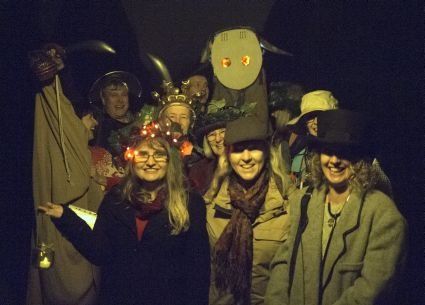Waes Hael!
Waes Hael! Good luck and good health to you all!

Wassail!
It’s wassailing time. Soon the streets of Stroud will be filled with dancers, mummers and singers. There will be fabulous costumes and fabulous beasts out and about.
What is it all about?
Originally “Waes Hael” was simply a greeting. It comes from two Anglo Saxon words and means, simply, “be whole” or “be healthy”. The response is usually to say “Drinc Hael” or “drink healthily”. So, sometimes, the words are used as a toast. It may be where we get the toast “to your health” from. Over time, the words have become conjoined to different forms such as “Wassail”, “Waysail”, “Wassel” or “Wassle”.
The Wassailing Custom
In olden times, during winter, there was little work for the agricultural poor to do. Money and food were in short supply and it was more than just a little boring.
So people would go “wassailing”. This meant visiting wealthier neighbours and wishing them “Waes Hael”. It meant offering them entertainment such as a song or a play. In exchange, they expected money, food or drink.
This was, effectively, a form of begging. So, to avoid being recognised by neighbours, wassailers would often go in disguise. In fact, in some parts of the country, wassailing is called “guising”. The disguise could involve costumes and masks. In the most basic form of disguise, wassailers would turn their coats inside out and blacken their faces with soot. Today you will often see wassailers and Morris dancers with black faces and outlandish costumes echoing this tradition.
Wassailers, if they did not get what they wanted, might not react too well. They might refuse to leave or even commit some act of minor vandalism. You can get some sense of this in the traditional carol “We wish you a merry Christmas” when the wassailers sing “Oh, bring us some figgy pudding….. We won't go till we get some, so bring it right here.”
Gloucestershire Style of Wassail
In the 19th century folklorists started to take an interest. Two basic forms had developed.
The first, and best known by the general public, was the apple orchard wassail. This involves going into the orchards to bless the trees; reciting of rhymes, hanging toast onto the trees, pouring cider into the roots and blasting shotguns into the branches. Sometimes this custom is referred to as “bud blowing”.
No traditional versions of this type are known in Gloucestershire.
The second type was the house to house visiting wassail; the type that was widespread in Gloucestershire. Wassailers would wish householders health and success for the coming year and sing them a song. The verses would be chosen to suit the householder. So we see wishes for a “good crap (crop) of corn”, a “good flock o’ ship (sheep)” or a “jolly fat peg (pig)”.
Wassailers often carried a “wassail bowl”. This was used to collect money or to drink from, but most often was decorated with greenery for pure decoration. They would also take around a “broad”; a mock bull carried on a stick, made with cow’s horns attached to a face made out of a board and some sacking to cover the bearer.
The Stroud Wassail
Enthusiasts got together in 2014 and secured Heritage Lottery Funding for a project which collected together songs and tunes from Gloucestershire onto a web site. This included 17 wassail songs from various parts of Gloucestershire. Clearly there had been a thriving tradition in the county at some time.
One of these songs was specific to Stroud. The song collector, Gwilym Davies, also had a recording, from 1979 of a man who described groups going around the town around 1914 with a decorated wassail bowl. He also sang a snatch of a Wassail song.
The decision was made to re-start a wassailing tradition in Stroud. From modest beginnings, with a dozen people meeting at the Museum in the Park, the event has grown. In 2017 there were several hundred participants with multiple events in the town and beyond.
The New Stroud Tradition
The Stroud Wassail has a number of elements. From early December, though to the second week of January, the Stroud Wassailers visit pubs, hotels, private parties and other venues throughout the area. They perform songs and a new play which features many local personalities.
Then, on the second Saturday of the year, the Wassail itself takes place in Stroud. The day starts with entertainment throughout the streets from dancers, actors and others. A procession leads the crowd to the front of the Subscription Rooms. They knock on the door and demand admission. The door is opened by the Master of the House (the mayor) and a broad enters to chase out all those within. The Master then invites the wassailers inside for beer and cake. Another wassail for families takes place at the Museum. The day ends with the Revels; a variety entertainment featuring dancing, drama, storytelling and more.
Wassail to Everyone
The wassail wishes all of the citizens of Stroud, and visitors to the town, a healthy and successful year. It boosts trade, enhances community spirit and supports local charities.
At its heart, it is about going out and meeting friends and neighbours; wishing them well. It is not confined to those with an interest in history or traditional folk customs. It is not confined to people of a specific religious or political belief. It is certainly not confined to any particular racial background.
So please enter into the spirit of the Wassail. Get out there. Watch the entertainment. Sing with us. Dance with us. But above all else, wish each other success and good health.
Waes Hael!
Be a Performer!
Stroud Wassail is eager to talk to anyone who would like to take part in the Wassail. We are always looking for dancers, singers and other entertainers of all types. The Wassail is not just for those involved in the folk tradition. It’s for everyone.
To find out more: robin@robinburton.co.uk